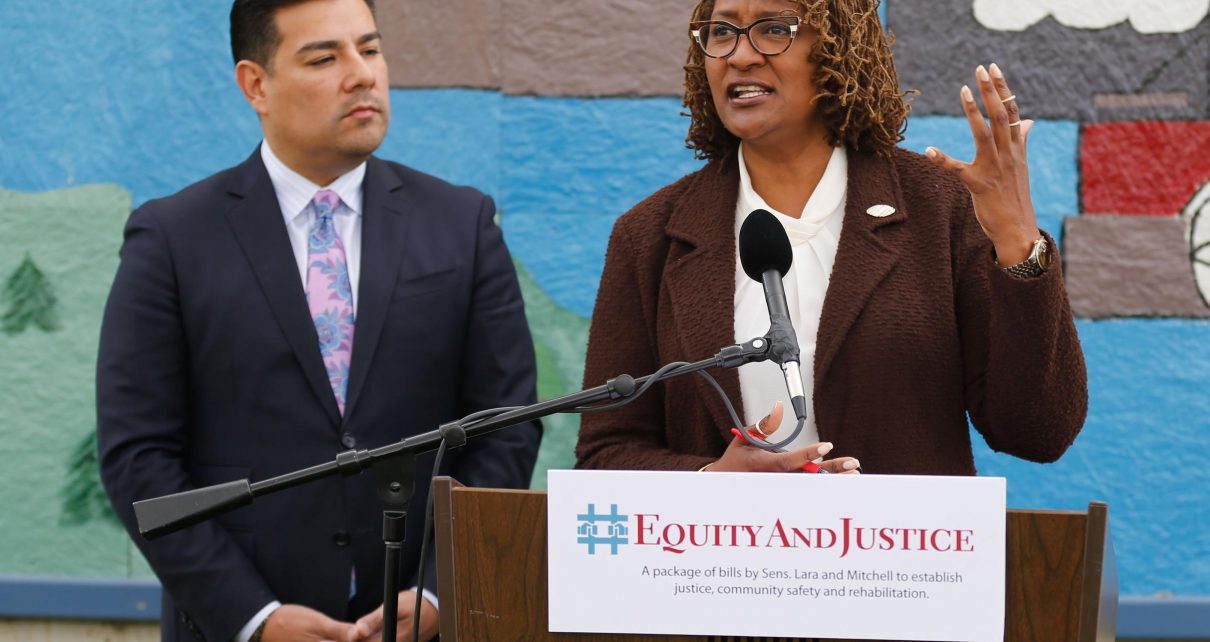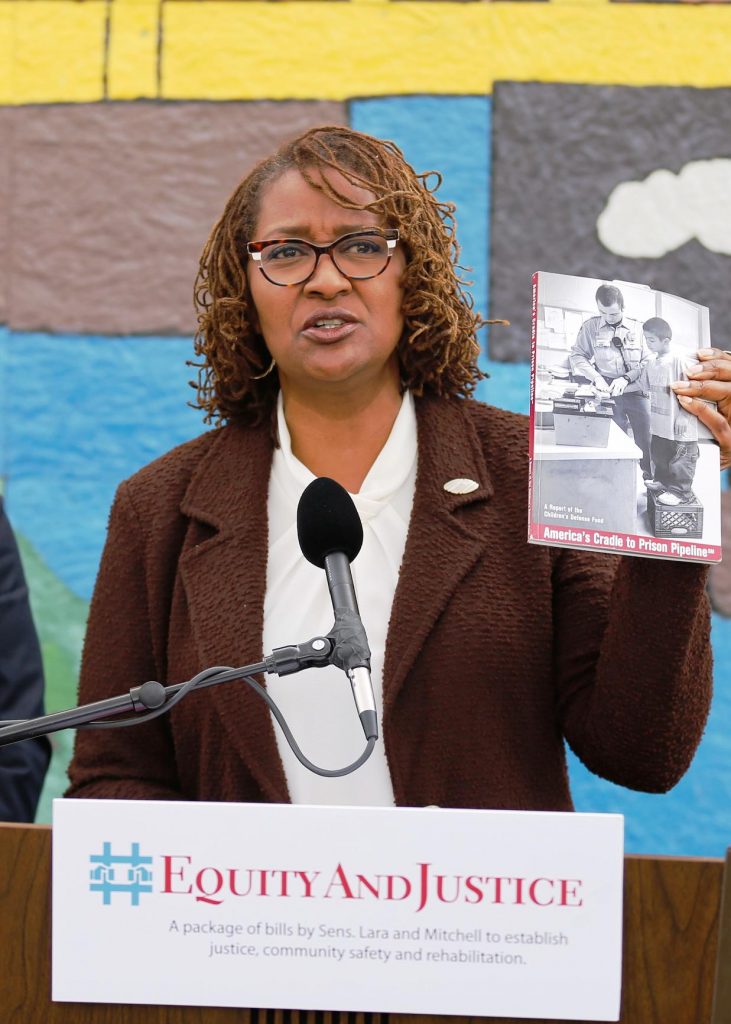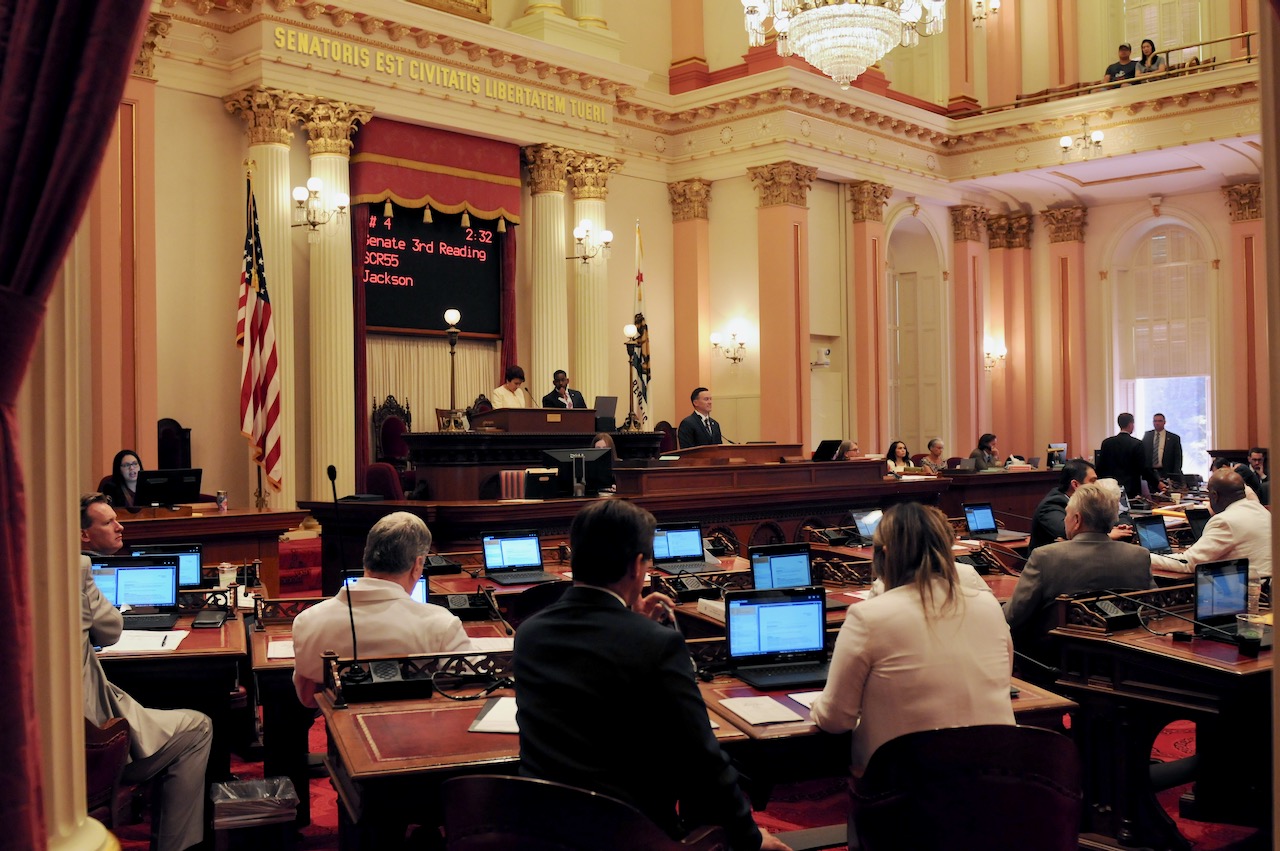
Equity and Justice Package of Bills Represents Unprecedented Reform
Ten Laws Signed by Gov Brown Means a New Day for Juvenile Justice
By State Sens. Holly J. Mitchell and Ricardo Lara, October 3, 2018 7:30 am

In the winter of 2016, we introduced bills to bring common sense back into the criminal justice system after an era of mass incarceration.
Now, after the signing of the 10th bill on Sunday, California has moved the needle on restoring the values of rehabilitation, equity and family cohesion through our #EquityAndJustice bill package.
This achievement is unprecedented nationwide.
The milestone changes in law are projected to usher in an era that promotes public safety, builds more resilient communities, and improves racial and economic fairness for generations.
With the support of Gov. Jerry Brown, who has signed 10 #EquityAndJustice bills over the past two years, the reforms will impact multiple levels of the criminal justice system. From establishing a minimum age for prosecution to providing Miranda Rights to minors to ending excessive fees charged to juveniles found innocent, #EquityAndJustice focuses much of its reforms on children and teenagers who are far too young to be habituated to a system of incarceration.
We are striving to create a California where all children have access to the resources they need to thrive. Fair and age-appropriate treatment by the juvenile and criminal justice systems is one piece of the puzzle. Thirty years of harsh sentencing laws resulted in overcrowded prisons without improving public safety. We need to be tough but smart on crime. With these laws, California is reducing mass incarceration through research-based reforms that will contribute to public safety.”
The #EquityAndJustice package is comprised of six bills from 2017 and four from 2018.
Last year’s bills were Senate Bill 180 – Drug Sentence Enhancements, which reduces sentence enhancements for certain low-level, nonviolent drug offenses; SB 190 – Ending Juvenile Fees, which ended financially burdensome administrative fees for youth involved in the juvenile justice system and their struggling families; SB 355 – No Court Fees for the Innocent, which provides that only those who are convicted of a crime are required to reimburse the courts for legal counsel fees; SB 393 – Sealing of Arrest Records, which ends public access to those arrested but not convicted of a crime; SB 394 – Juveniles Life Without the Possibility of Parole, which bars sentencing juveniles to life without parole; and SB 395 – Miranda Rights for Youth, which requires those age 15 or younger to consult with legal counsel before they waive their constitutional rights.
This year’s #EquityAndJustice bills are SB 439 – Minimum Age Incarceration, which would exclude children age 11 and younger from juvenile court jurisdiction; SB 1050 – Services and Support for Exonorees, a call to help the wrongly convicted transition back into society; SB 1391 – Juvenile Justice for Children Under 16, to ensure that youth ages 14 and 15 who commit crimes get services and needed help by prohibiting them from being tried as adults; and SB 1393 – Fair and Just Sentencing Reform, to restore the court’s discretion on the imposition of a five-year sentence enhancement for serious felonies.
The projected collective impact of the #EquityandJustice effort over the last two years will be felt first by communities across the state as a tangible reinvestment. Millions of dollars will shift from the housing of individuals in the correctional system to the programing and services offered by cities, counties and communities.
Mass incarceration has been a crisis in the making for decades. In June of 2005, California was forced into federal receivership largely due to prison overcrowding. This was just one symptom of a larger problem. At that time the state had already spent decades entrenched in the failed “war on drugs” and “tough on crime” approach to incarceration and sentencing. The result: skyrocketing recidivism rates and a devastating impact on black and brown communities.

This criminalization of youth and mass incarceration of black and brown communities resulted in a system so overcrowded that basic health services were not provided and the state’s treatment of its prison population was deemed unconstitutional. Furthermore, California’s taxpayers felt the burden of a ballooning public safety budget that diverted funds toward methods that research has proven ineffective. Almost 13 years later we continue to struggle. The only way to finally end the receivership is to reform the broken system built on a “lock them up and throw away the key” approach rather than accountability, equity and rehabilitation.
Decriminalization of youth is a fundamental component of rehabilitation. Directing resources to ensure best outcomes for our youth is the first step, beginning with the arcane requirement that families already struggling must also pay for their children’s contact with the juvenile justice system. Criminologists recently found that juvenile debt correlates with a greater likelihood of recidivism, even after controlling for case characteristics and youth demographics. These negative outcomes from fees undermine the rehabilitative purpose of the juvenile system. Beyond the matter of improving outcomes for the youth, the collection of fees has been conducted in costly and unlawful ways, putting increased fiscal burdens on counties and unlawful financial duress on families.
Now law for nearly 10 months, SB 190, which ended financially burdensome administrative fees, has resulted in nearly all 58 counties now in full compliance. This has saved about $207 million in discharged and relieved debt statewide. While the bill did not address past-due collections, it inspired at least 28 counties to relieve tens of thousands of families of nearly $225 million in old Juvenile Detention fees. The cost of collections on these fees, combined with the negative impact on families, has convinced the lion’s share of counties that it is a practice that must end.
As proof, the Los Angeles County Board of Supervisors is expected to cancel nearly $90 million in fees imposed on families that have had children in the juvenile detention system. In an Op-Ed in The Los Angeles Times on Sept. 11, Jeffrey Selbin, a clinical professor of law and director of the Policy Advocacy Clinic at UC Berkeley School of Law, which has published two studies of juvenile fees in California, welcomed the change.
“As L.A. joins half the state’s counties in demonstrating why children and their families deserve debt-free justice, other counties should follow its example and end the collection of these regressive and racially discriminatory fees,” Selbin wrote.
Youth outcomes have historically been linked to their contact with the juvenile justice system, unfortunately not in the way the system was originally intended. Children under the age of 12 end up ensnared in the justice system for exhibiting minor misbehaviors that are labeled misdemeanor offenses, such as petty theft or schoolyard fights. The odds of recidivating once initial contact is made is reason alone to shift away from the criminalization of youth to a more outcomes-based approach, not to mention the volumes of studies and reports that support a move from incarceration to treatment.
Of all of the youth interfacing with the system, in 2017 there were only 637 referrals to probation for children under the age of twelve, only nine percent of those children resulted in a petition and from there only three percent resulted in wardship status. If we could intervene with 637 children per year and ensure they receive services and care rather than incarceration and a 70 percent increased risk of recidivating, then why wouldn’t we? SB 439 would do just that.
For the 3 percent of children actually involved in serious crimes, there is an existing infrastructure of services available to the courts and counties. Santa Clara and Los Angeles counties are current leaders in providing these alternative services. Across the nation, 21 states have established a minimum age for juvenile court jurisdiction, including Nebraska and Massachusetts. Looked at on a global scale, the United Nations Convention on the Rights of the Child in 1989 declared that all nations must establish a minimum age no lower than 12 for their justice systems.
SB 1391 reforms laws passed in the 1990s that allowed children as young as 14 and 15 to be sentenced as adults – laws that contributed to recidivism and extreme racial and geographic disparities. By prohibiting 14- and 15-year-olds from being tried as adults, SB 1391 will keep them in the juvenile system that is better prepared for them. California law allows judicial review before a juvenile is released.
When you stop to think about the cost of incarceration, the counties pay the highest price. Prior to its passage in 2017, SB 180, the RISE Act, which calls for greater emphasis on prevention, non-violent, non-serious drug offenders were serving time at $45,000 per year per inmate. These individuals were never a public safety risk, but suffered with a lack of healthcare services as they were facing a public health crisis. This reform measure puts greater emphasis on prevention, rehabilitation and maintaining family cohesion by reducing sentence enhancements for certain low level, nonviolent drug offenses.
Community reinvestment is the building block of rehabilitation. The RISE act was building on the rehabilitation focus of our correction system, aligning California with the rest of the nation in the interest of justice and community reinvestment. This is needed because for nearly half a century the current failed sentencing system has devastated families and individuals with unfair and unjust extended sentencing practices which research has shown to be ineffective while costing the state more money for no gain.
Fair and just sentencing practices in California will align with modern research and studies that reveal the injustice and inefficiency of the current system. SB 1393 continued the sentencing reform efforts by returning judicial discretion for the application of the 5-year sentence enhancement. This measure also reduces the monetary burden on taxpayers that fund unnecessarily long prison terms and instead divert those resources to much needed state programs that benefit healthcare, education and infrastructure. Ultimately, SB 1393 will build upon the concepts of rehabilitation and community reinvestment in a way that serves in the interest of justice.
Public health strategies were sorely lacking as the tough on crime model emphasized incarceration. This ultimately contributed not only to the federal receivership in the corrections system, but also the worst epidemic of fatal opioid overdoses in our country’s history, as well as high rates of HIV and viral hepatitis among drug users. It costs on average $45,000 per year, per inmate incarcerated. This adds up to more than $135,000 each time the three-year enhancement was applied. These bills returned valuable dollars to communities, beginning with community-based drug treatment, employment and housing for persons with prior convictions, and preschool and afterschool programs which have been proven to reduce adolescent drug use and involvement in the drug market.
In summary, we believe the two-year legislative effort will have a lasting and positive impact on the state, and hopefully the nation. The guiding principles of #EquityAndJustice for reform include public health, community reinvestment, decriminalization of youth, elimination of mass incarceration and fair and just sentencing reform. It is time to see to the rehabilitation of California’s corrections and rehabilitation system.
Sen. Mitchell is chair of the Senate Budget Committee. A member of the Legislature since 2010, Mitchell represents Senate District 30, which includes Culver City and much of Los Angeles. More at www.senate.ca.gov/Mitchell
Sen. Ricardo Lara is chair of the Senate Labor Committee and was first elected to the Legislature in 2010. He represents Senate District 33, which includes Long Beach and the Southeast Los Angeles cities of Bell, Bell Gardens, Cudahy, Huntington Park, Lakewood, Lynwood, Maywood, Paramount, Signal Hill, South Gate, and parts of Los Angeles. More at www.senate.ca.gov/lara
- Equity and Justice Package of Bills Represents Unprecedented Reform - October 3, 2018




